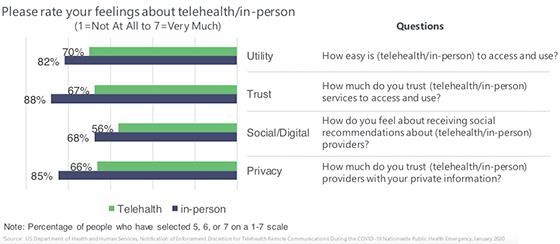Online Experience Increasingly Important To Consumers As Trust Erodes, Performics Study Finds
- by Laurie Sullivan @lauriesullivan, July 20, 2021

Consumers crave community and social interaction. While remote services are helpful, one size doesn’t fit all. Data collected about the telehealth industry shows that consumers want convenience, but also in-person personalized experiences.
That seems to be the message based on a study from The Intent Lab, a research partnership between Performics and Northwestern University Medill School of Journalism, Media, Integrated Marketing Communications. The research data was fielded between March 19 and March 21, 2021.
The data found that while retail stores and pharmacies provide affordable and convenient care, 37% of people trust independent private doctors, rather than retail stores for telehealth services. Only 12% trust retail stores.
While trust declined during the pandemic, highlighting a long-term erosion of consumer confidence in the information they get online, as a utility the usefulness of online services continues to power an increase in satisfaction.
Telehealth is one utility that became useful during COVID, according to The Intent Lab study. The study suggests 54% of respondents have used telehealth, with 68% of those using it after COVI-19 began.
Zoom is the most common telehealth tool, making up 42% of total responses, with 68% of telehealth services done on video chat and 58% on a phone call.
The top eight tools for virtual healthcare services include Teladoc, Zocdoc, BetterHelp, and VSee, while the other half are general telecommunication tools like Zoom, and Skype.
Consumers turned to telehealth as a result of social distancing, so The Intent Lab wanted to track consumer satisfaction with digital experiences.
For the past five years, the organization analyzed factors such as trust and utility.
The study defines utility as the “usefulness of an online experience, including the assessments of how efficient it is to get things done online versus offline and how easily information can be accessed.”
COVID-19 forced social interactions to become virtual and remote work to sustain productivity. This abrupt shift to digitalizing everything had a positive impact in DSI, which has increased since our last wave.
Some 69% of consumers used telehealth services to seek a General Practitioner, compared to those looking for specialists.
Around 70% of respondents were interested in getting General Practitioner services, and prescription and refills, as well as nutrition counseling through telehealth post-COVID.
The top three concerns for telehealth include -- but were not limited to -- credibility, accuracy, and physical inspection. Privacy and security, as well as communication, followed.



